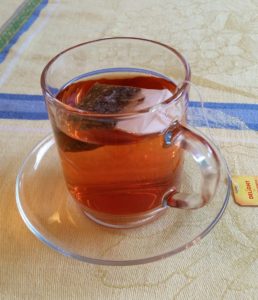 Some good news. A study found that frequent consumption of foods and beverages containing flavonoids by elderly women had health benefits. Flavonoids are compounds found naturally in plants, and that have health-promoting effects.
Some good news. A study found that frequent consumption of foods and beverages containing flavonoids by elderly women had health benefits. Flavonoids are compounds found naturally in plants, and that have health-promoting effects.
The 881 women (aged 78 to 82 years) in the Australian study were less likely to have abdominal aortic calcification (AAC) if they ingested high levels of flavonoids in their diet. This is significant because AAC is a major predictor of cardiovascular disease events, such as heart attacks, strokes, and death.
Drinking black tea daily was their major source of flavonoids. Drinking 2 to 6 cups a day lowered the risk of having extensive AAC.
Good flavonoid sources are: black tea, green tea, wine, apples, nuts, citrus fruits, berries, grapes, onions, broccoli, kale, parsley, and dark chocolate. There are different types of flavonoids, each with different health-promoting effects. This is why it's good to eat a variety of fruits and vegetables.
From Science Daily: Put the kettle on! How black tea (and other favorites) may help your health later in life
A daily cup of tea could help you to enjoy better health late in life -- however if you're not a tea drinker, there are other things you can add to your diet.
The key is flavonoids, which are naturally occurring substances found in many common foods and beverages such as black and green tea, apples, nuts, citrus fruit, berries and more.
They have long been known to have many health benefits -- however new Edith Cowan University (ECU) research shows they may be even better for us than previously thought.
The Heart Foundation supported a study of 881 elderly women (median age of 80), which found they were far less likely to have extensive build-up of abdominal aortic calcification (AAC) if they consumed a high level of flavonoids in their diet.
AAC is the calcification of the abdominal aorta -- the largest artery in the body which supplies oxygenated blood from the heart to the abdominal organs and lower limbs -- and is a predictor of cardiovascular risk such as heart attack and stroke. It has also been found to be a reliable predictor for late-life dementia.
"In most populations, a small group of foods and beverages -- uniquely high in flavonoids -- contribute the bulk of total dietary flavonoid intake," he said. "The main contributors are usually black or green tea, blueberries, strawberries, oranges, red wine, apples, raisins/grapes and dark chocolate."
There are many different types of flavonoids, such as flavan-3-ols and flavonols, which the study indicated appear to also have a relationship with AAC.
Study participants who had a higher intake of total flavonoids, flavan-3-ols and flavonols were 36-39 per cent less likely to have extensive AAC.
Black tea was the study cohort's main source of total flavonoids and was also associated with significantly lower odds of extensive AAC. Compared with respondents who didn't drink tea, participants who had two-to-six cups per day had 16-42 per cent less chance of having extensive AAC.
However, some other dietary sources of flavonoids such as fruit juice, red wine and chocolate, did not show a significant beneficial association with AAC.
Though black tea was the main source of flavonoids in the study -- likely due to the age of the participants -- Mr Parmenter said people could still benefit from flavonoids without putting the kettle on.
"Out of the women who don't drink black tea, higher total non-tea flavonoid intake also appears to protect against extensive calcification of the arteries," he said. "This implies flavonoids from sources other than black tea may be protective against AAC when tea is not consumed."
